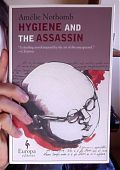
Amélie Nothomb
Hygiene and the Assassin
Yesterday I had some wonderful reading time and quickly finished Hygiene and the Assassin by Amélie Nothomb. Though I finished Middlemarch by George Eliot the week before, there isn’t a large enough space for me to write about it, so I’m skipping it. Instead: Amélie Nothomb, a Belgian writer extremely popular in France and Belgium. She prolifically puts out one book a year, thin ones, but still: one book a year! And apparently each publication is displayed prominently in Parisian shop windows. “The French love her,” says my French friend.
Hygiene and the Assassin was Nothomb’s first book that was written at twenty-five. And since it’s been a book a year. With over twenty books published, Nothomb begins to seem a lot like her hero, Prétextat Tach. Except for the sex difference, of course, and, well, his obesity and utter rudeness, though I’m not sure what Nothomb is like in real life to continue making comparisons.
Tach is diagnosed with a month or so to live, which triggers a rush of journalists seeking interviews with the Nobel Prize winning author. The journalists are narrowed down to five, which makes it quickly apparent that Tach is not an easy person to deal with. His misanthropy and general curmudgeon personality have kept him inside his house for sixty-six years.
I had picked up Hygiene and the Assassin looking for a quick and easy read after the laborious Victorian prose of Middlemarch. Though it’s short, Nothomb packs in a lot to think about in her well conceived and executed dialogue. The whole book is dialogue. When a physical description of action or appearance came up outside quotation marks, it threw me aback.
The journalists fail one by one; they either get kicked out or run out of the house themselves, until the final interviewer comes around, a woman who has actually read all of Tach’s books. Tach hates women more than he hates people in general. But this woman is as witty and quick with the insults as Tach himself and soon finds herself on equal footing with the writer, allowing her to dig up his strange past.
Nothomb excels at writing the rapid exchange that was always passing between Tach and whomever he was talking to. There was never a dull moment.
Early on in the book Tach talks to an interviewer about what one needs to be a writer, which is something I want to paraphrase here, if only for my own safekeeping. The first is balls to resist the prevailing bad faith; then a prick, an ability to create; next lips, which fulfill two roles. They make words into a sensual act, but even more importantly lips prevent the hands from writing what must not be written. Next on the list is an ear to hear the words on the inside, and lastly a hand for pleasure.
This is devastatingly important. If a writer is not having pleasure, then he must stop immediately. To write without pleasure is immoral. Writing already contains all the seeds of immorality. The writer’s only excuse is his pleasure.
As I read I went back and forth between really liking the book and thinking it a bit too much. Hygiene and the Assassin pays off on close reading where the well crafted dialogue can reveal all its jewels. Unfortunately I didn’t give the book the attention it deserves, another point that Tach continuously makes: the importance of reading without a wet suit on. And that’s fine for now, as I’m never going to interview Amélie Nothomb.
· · · · · · · · · · · · · · · · · · · ·